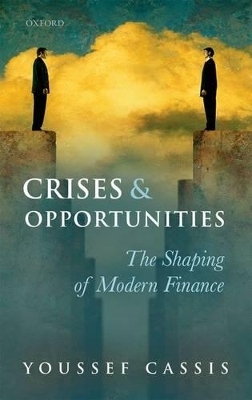
Crises and Opportunities
The Shaping of Modern Finance
Seiten
2011
Oxford University Press (Verlag)
978-0-19-960086-1 (ISBN)
Oxford University Press (Verlag)
978-0-19-960086-1 (ISBN)
This book examines the differences and commonalities of eight global financial crises since the late nineteenth century (including the Great Depression of the 1930s and the Financial Debacle of the early twenty-first century) to give insights into how the financial landscape has - or has not - been reshaped after a systemic shock.
As the world's political and economic leaders struggle with the aftermath of the Financial Debacle of 2008, this book asks the question: have financial crises presented opportunities to rebuild the financial system?
Examining eight global financial crises since the late nineteenth century, this new historical study offers insights into how the financial landscape - banks, governance, regulation, international cooperation, and balance of power - has been (or failed to be) reshaped after a systemic shock. It includes careful consideration of the Great Depression of the 1930s, the only experience of comparable moment to the recession of the early twenty-first century, yet also marked in its differences.
Taking into account not only the economic and business aspects of financial crises, but also their political and socio-cultural dimensions, the book highlights both their idiosyncrasies and common features, and assesses their impact in the broader context of long-term historical development.
As the world's political and economic leaders struggle with the aftermath of the Financial Debacle of 2008, this book asks the question: have financial crises presented opportunities to rebuild the financial system?
Examining eight global financial crises since the late nineteenth century, this new historical study offers insights into how the financial landscape - banks, governance, regulation, international cooperation, and balance of power - has been (or failed to be) reshaped after a systemic shock. It includes careful consideration of the Great Depression of the 1930s, the only experience of comparable moment to the recession of the early twenty-first century, yet also marked in its differences.
Taking into account not only the economic and business aspects of financial crises, but also their political and socio-cultural dimensions, the book highlights both their idiosyncrasies and common features, and assesses their impact in the broader context of long-term historical development.
Professor of Economic History, European University Institute, Florence. His work mainly focuses on banking and financial history, as well as business history more generally. His numerous publications on the subject include City Bankers, 1890-1914 (1994), Big Business: The European Experience in the Twentieth Century (1997), and Capitals of Capital: A History of International Financial Centres, 1780-2005 (2006).
Foreword ; Introduction ; 1. Pre-War Crises ; 2. Post-War Crises ; 3. Banks ; 4. Governance ; 5. Regulation ; 6. International Cooperation ; 7. Balance of Power ; Conclusion
| Erscheint lt. Verlag | 7.4.2011 |
|---|---|
| Verlagsort | Oxford |
| Sprache | englisch |
| Maße | 149 x 222 mm |
| Gewicht | 414 g |
| Themenwelt | Geschichte ► Teilgebiete der Geschichte ► Wirtschaftsgeschichte |
| Wirtschaft ► Betriebswirtschaft / Management ► Finanzierung | |
| Wirtschaft ► Betriebswirtschaft / Management ► Marketing / Vertrieb | |
| Wirtschaft ► Volkswirtschaftslehre ► Finanzwissenschaft | |
| ISBN-10 | 0-19-960086-4 / 0199600864 |
| ISBN-13 | 978-0-19-960086-1 / 9780199600861 |
| Zustand | Neuware |
| Haben Sie eine Frage zum Produkt? |
Mehr entdecken
aus dem Bereich
aus dem Bereich
die Ukraine, Polen und der Irrweg in der russischen Geschichte
Buch | Hardcover (2023)
C.H.Beck (Verlag)
28,00 €


